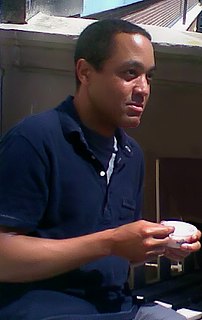A Quote by Robert Burchfield
I believe it is imperative to see modern English grammar as a rich and diverse linguistic system deposited on our [England's] shores 1,500 years ago, and left with us unweakened, though substantially changed by the social and political events of the intervening period.
Related Quotes
We have all been brought up with an ethical system of 2,000 years ago, an industrial-managerial system of 200-300 years ago, a statecraft system of 200 years ago, and so on. None of this is working very well for the requirements of a time as complex and variegated as our own. So we stand shuttering at the threshold, with no clear map.
Historical grammar is a study of how, say, modern English developed from Middle English, and how that developed from Early and Old English, and how that developed from Germanic, and that developed from what's called Proto-Indo-European, a source system that nobody speaks, so you have to try to reconstruct it.
But I don't know, maybe it's just as well I never got there. I dreamed about it for so many years. I used to go to English movies just to look at the streets. I remember years ago a guy I knew told me that people going to England find exactly what they go looking for. I said I'd go looking for the England of English Literature, and he nodded and said: "It's there.
I believe there is no liturgy in the world, either in ancient or modern language, which breathes more of a solid, scriptural, rational piety, than the Common Prayer of the Church of England. And though the main of it was compiled considerably more than two hundred years ago, yet is the language of it, not only pure, but strong and elegant in the highest degree.
The tradition of nonviolence, optimism, concern for the individual, and unconditional compassion that developed in Tibet is the culmination of a slow inner revolution, a cool one, hard to see, that began 2,500 years ago with the Buddha's insight about the end of suffering. What I have learned from these people has forever changed my life, and I believe their culture contains an inner science particularly relevant to the difficult time in which we live.
Modern language must be older than the cave paintings and cave engravings and cave sculptures and dance steps in the soft clay in the caves in Western Europe, in the Aurignacian Period some 35,000 years ago, or earlier. I can't believe they did all those things and didn't also have a modern language.
A few years ago, they [Neandertals] were thought to be ancestral to anatomically modern humans, but now we know that modern humans appeared at least 100,000 years ago, much before the disappearance of the Neandertals. Moreover, in caves in the Middle East, fossils of modern humans have been found dated 120,000-100,000 years ago, as well as Neandertals dated at 60,000 and 70,000 years ago, followed again by modern humans dated at 40,000 years ago. It is unclear whether the two forms repeatedly replaced one another by migration from other regions, or whether they coexisted in some areas
New information technologies-including email, the web, and computerized blast-faxes and phone calls-have fundamentally changed the landscape of political competition in modern democracies. They've done so in three ways: by dramatically boosting the access of individuals and special interests to politically potent information, by making it easier for such people to coordinate their activities and exert political power, and by greatly increasing the pace of events within our political systems.
We believe that the developing crisis in the capitalist system, by which we mean both economic stagnation, and the social and political conflicts to which it gives rise, makes it possible to think in terms of developing a sizeable and serious revolutionary socialist party in a way that was not possible 20 or even 10 years ago.




































